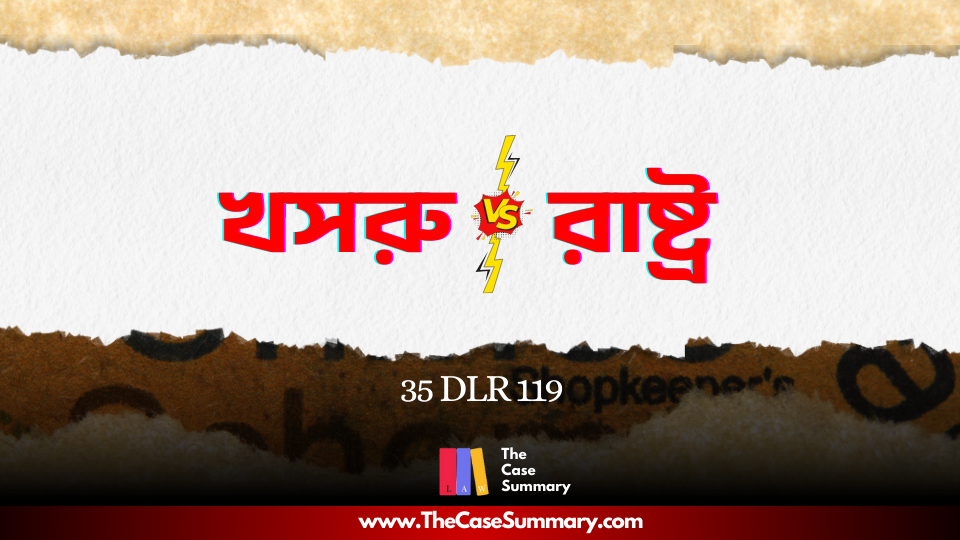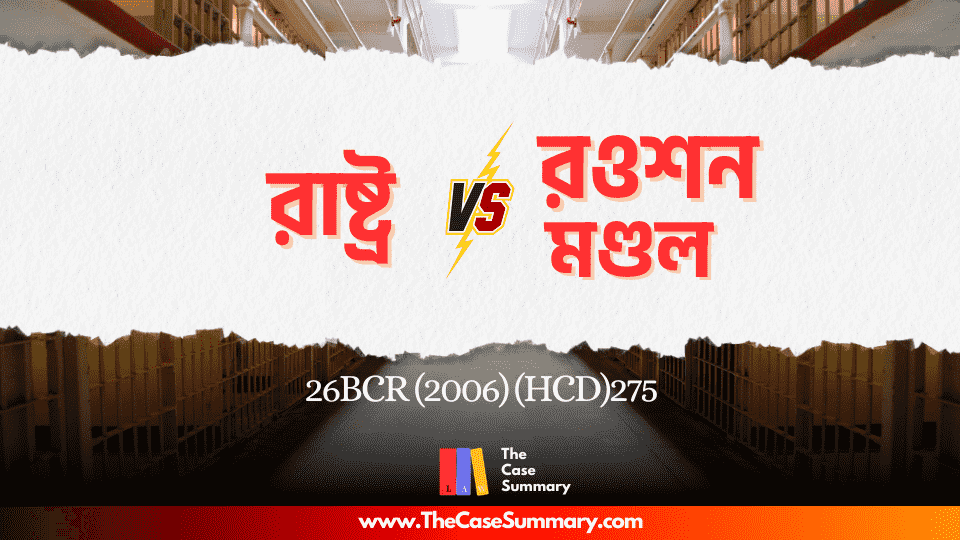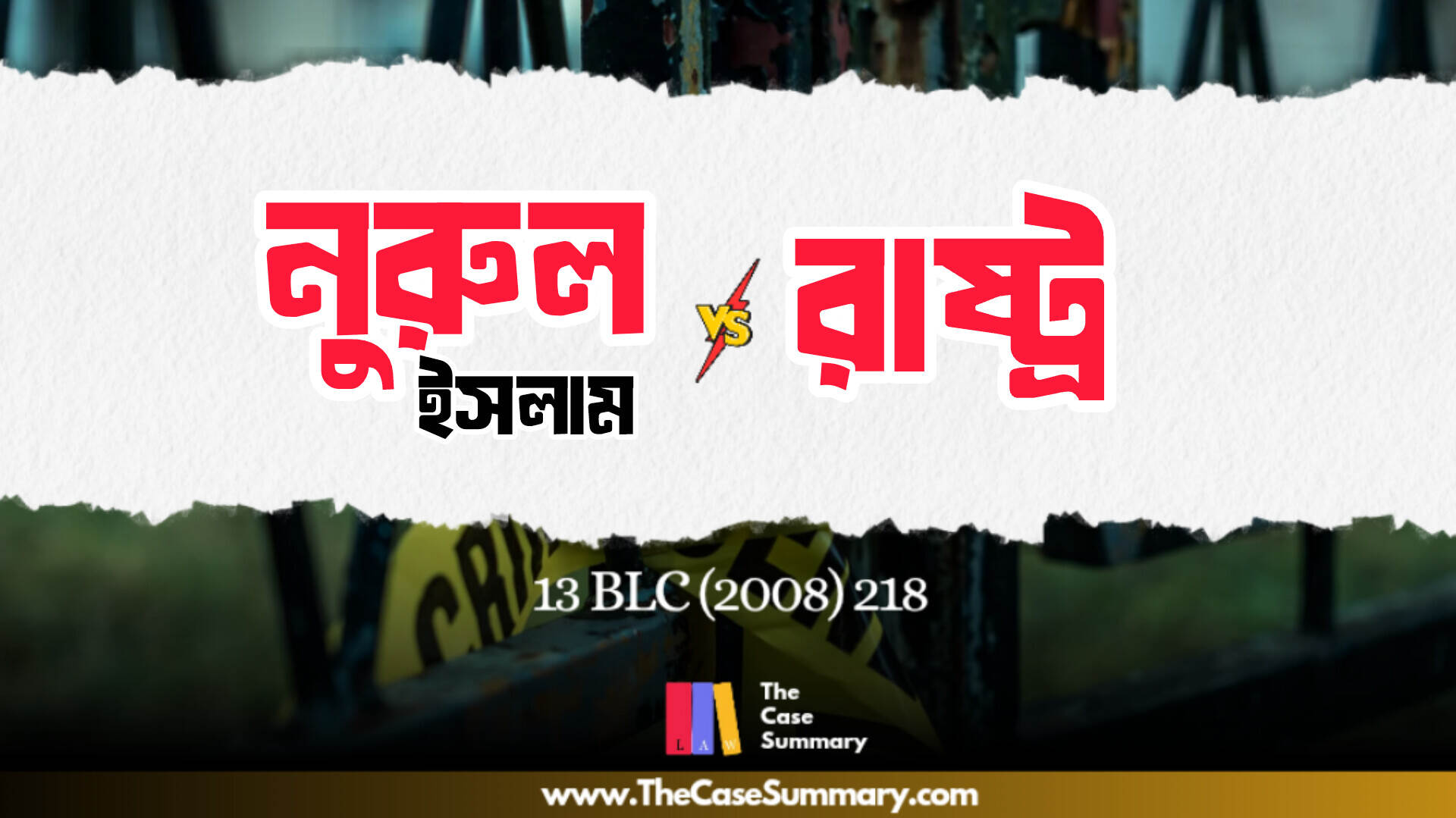Bangladesh Legal Aid and Services Trust and Another vs Bangladesh (Shukur Ali Case)
Reference : 68 DLR (AD) [2016]
Jurisdiction : Bangladesh
Plaintiff : Bangladesh Legal Aid and Services Trust (BLAST) and Another
Defendant : Government of the People’s Republic of Bangladesh
Facts :
On June 11, 1999, seven year old Sumi Akter was playing in the verandah of her house at Tepra in Shibalaya, Manikganj with two other persons close to her age. At about 2:30 pm, she was reported missing. After searching from door to door her corpse was recovered from the locked house of Shukur Ali (Plaintiff). Her jewelry was missing and there were signs of trauma on her legs and a reddish liquid was found around her genital area. The plaintiff was then caught by the people of Tepra and admitted to raping and killing Sumi Akter.
Ali was tried and convicted under Section 6(2) of the Nari-o-Shishu Nirjatan (Bishesh bidhan) Ain, 1995 which provides that ❝any person convicted of causing death during or after the commission of rape must be sentenced to death❞; accordingly, Ali was sentenced to death. Although, it was noted that the representation provided by Ali’s state-appointed defense lawyer at the initial trial was inadequate, the conviction and death sentence were upheld on appeal.
Prior to Ali’s trial and conviction, the 1995 Ain was replaced by the Nari-o-Shishu Nirjatan Daman Ain, 2000 [the 2000 Ain], which gave the court the discretion to impose either the death sentence or a life sentence for such offences. However, it also provided that any offence committed under the 1995 Ain should be tried and convicted as though that legislation was still in place. The High court upheld the death sentence.
Issue :
Whether the mandatory death sentence imposed for specific offenses is eligible for commutation or review under Bangladeshi law and international human rights standards?
Decisions :
The Appellate Division held that while the death penalty itself was constitutional—a point conceded by both parties—any mandatory provision that removes the judiciary’s discretion to consider all facts and circumstances surrounding an offense, including the offender’s age and mitigating factors, was unconstitutional. As a result, Section 6(2) of the Nari-o-Shishu Nirjatan (Bishesh bidhan) Ain, 1995, along with any law providing for a mandatory death sentence, was deemed ultra vires the Constitution.
In reaching this conclusion, the Court invoked international principles, including the prohibition of cruel, inhuman, or degrading punishment in Article 5 of the Universal Declaration of Human Rights and the right not to be arbitrarily deprived of life in Article 6 of the International Covenant on Civil and Political Rights, as reflected in Article 35 of the Constitution. The Court accepted BLAST’s argument that, when domestic laws are unclear or silent, national courts should draw upon international provisions for guidance. This included viewing inflexible death sentences as arbitrary, as they remove the judiciary’s ability to make nuanced decisions.
Furthermore, the Court found that Ali’s sentencing was discriminatory due to the subsequent replacement of the 1995 Act with the 2000 Act, which allowed for greater judicial discretion. The Court also referenced Islamic teachings that regard life as sacred and promote compassion. It was commented that legislation providing mandatory sentences reduces the courts to a ❝rubberstamp of the legislature❞ and impedes the courts’ power to take into account all circumstances surrounding the offence when it comes to fair sentence.
Hence, the Court ruled mandatory death sentences to be unconstitutional, as they strip the judiciary of its discretion to properly assess the circumstances surrounding the offense and the offender. Although Section 6(2) of the 1995 Act was declared unlawful, the Court ultimately commuted Shukur Ali’s death sentence to life imprisonment, acknowledging the severity of the crime while allowing for a more just punishment. Ali’s execution was stayed for two months to permit him to appeal his commuted sentence.
Relevant Law :
- International Covenant on Civil and Political Rights, 1966
- Article : 6
- Universal Declaration of Human Rights, 1948
- Article : 5
- Constitution of the People’s Republic of Bangladesh
- Article : 32, 35(3), 35(5)
- Nari-o-Shishu Nirjatan (Bishesh Bidhan) Ain, 1995
- Nari-o-Shishu Nirjatan Daman Ain, 2000 (Amended in 2003)
- Children Act, 1974
Author :
1. Raiyan Talukder
Note : The Case Summary is a platform by the law students, for the law students. We aim to summarize the facts and decisions of various important cases in both Bangla and English with utmost caution. However, this platform is in no way a replacement for going through the complete judgements by the law students and we discourage any learner from relying on case summaries alone. Thank you



